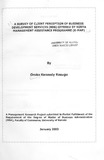| dc.description.abstract | This research project was conducted to study client perception of Business Development
Services offered by Kenya Management Assistance Programme (K-MAP). The study
focused on a population of 1500 elements drawn from K-MAP client list. These clients
were spread all over Kenya.
To conduct the study, 100 respondents were randomly sampled from the population, and
questionnaires mailed to them. In the questionnaire, were questions among them those
asking respondents to outline problems they faced in the course of their business
operations. There were questions on what type of Business Development Services (BDS)
they sought to address their stated problems; and others on what type of BDS they
received from K-MAP, and how useful they found them.
The study had two main objectives:
1. To determine the types of BDS desired by clients against those offered by KMAP.
2. To determine the MSEs owner/manager's perception of the BDS provided to
them by K-MAP.
The study then set to test the following hypothesis:
Ho The Business Development Services received from K-MAP is
independent of the BDS sought by respondents.
The Business Development Services received from K-MAP is
not independent of the BDS sought by respondents.
Out of the 100 targeted respondents, 41 elements responded four of which were "return to
sender, address unknown". This left 37 elements available for analysis. Data obtained
from the elements was analyzed using the SPSS computer package. In the analysis, data
was tabulated in the form of frequencies and percentages; and from this, the first
objective was determined. Mean rankings, and test for independence of BDS using
regression analysis followed. This was used to determine the second objective. The
study established that among others, respondents experienced the following problems in
the course of their business operations: Lack of adequate customers, lack of electricity
and water, poor record keeping, lack of credit, lack of information, and high competition.
In pursuance of solutions to their problems, respondents sought the following BDS:
Training in business skills, marketing, research and development, technology access,
information provision, consultancy services, and counseling.
Responding to questions on what BDS they received from K-MAP, respondents listed the
following: Marketing, Training in Business, Consultancy Services, and Counseling.
Research and Development, Technology Access, and Information Provision were not
provided. When data was analyzed, it was revealed that only 6.9% of BDS respondents
received from K-MAP was relevant to the BDS they sought. The remaining 93.1% of
BDS they received from K-MAP could be accounted by other factors not related with the
BDS they sought, and the error term. The supply of BDS was clearly supply driven and
not demand driven. Meanwhile, hypothesis testing concluded that Business Development
Services received from K-MAP is independent of the BDS sought by respondents.
The study recommends among others, that K-MAP needs to have a detailed analysis of
client problems, and the BDS they seek; and provide BDS according to the dictates of
client needs. Client needs is the starting point. | en |

